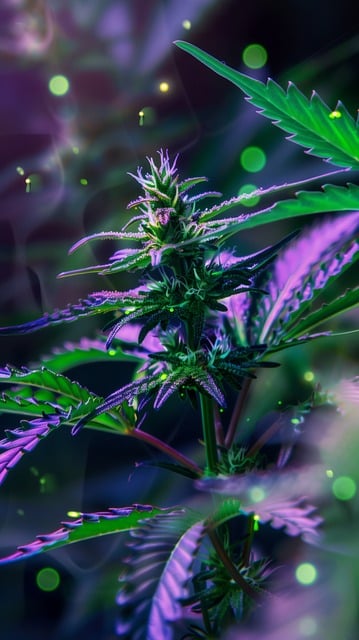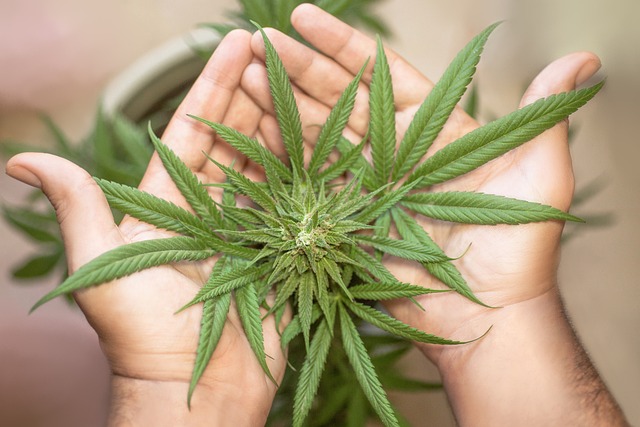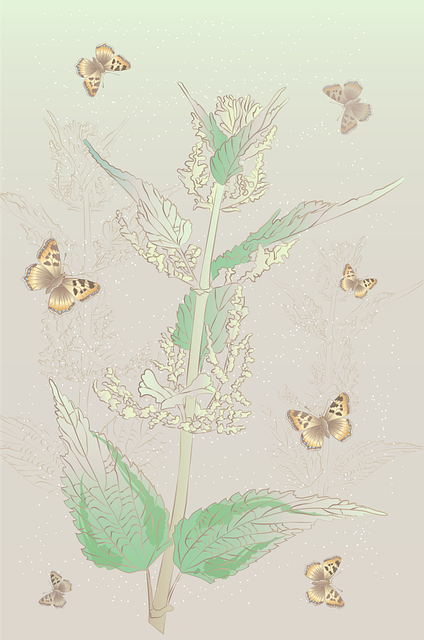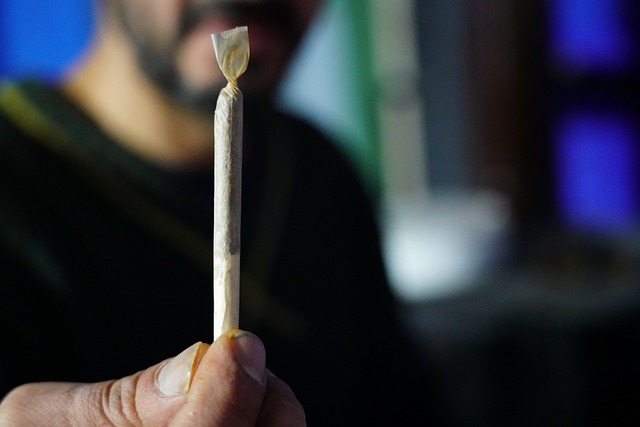
The THCA flower, a non-psychoactive cannabinoid, has garnered attention for its anti-inflammatory properties, with studies showing it can inhibit pro-inflammatory cytokines and enzymes like COX-2. This makes it a potential therapeutic agent for conditions such as arthritis and skin inflammations, as it works through the endocannabinoid system, specifically targeting CB2 receptors that modulate immune responses. Ongoing research in animal studies and clinical trials aims to further validate its benefits. THCA flower can be consumed through various methods including smoking/vaporizing, edibles, teas, tinctures, or topicals, offering versatility for targeted relief. Users are advised to ensure the legality of THCA flower in their region before consumption, as laws vary by location. The potential of THCA flower as a natural remedy for inflammation is promising and represents a significant development in non-psychoactive therapeutic interventions. Keywords: THCA flower anti-inflammatory effects.
Explore the transformative properties of THCA flower, a natural compound garnering attention for its potent anti-inflammatory effects. This article delves into the science and applications behind THCA’s role in combating inflammation. From its chemical makeup to practical consumption methods, uncover how this cannabinoid could be a game-changer in health and wellness. Join us as we dissect the therapeutic potential of THCA flower and its implications for health enhancement.
- Unveiling the Potential of THCA Flower and Its Anti-Inflammatory Properties
- The Science Behind THCA Flower's Role in Inflammation Reduction
- Practical Applications and Consumption Methods for THCA Flower as an Anti-Inflammatory Agent
Unveiling the Potential of THCA Flower and Its Anti-Inflammatory Properties

Delta-9-tetrahydrocannabinolic acid (THCA) flower, a raw form of cannabis that contains the cannabinoid THCA in its natural, non-psychoactive state, has garnered attention for its potential health benefits. One of the most studied properties of THCA is its anti-inflammatory effect. Laboratory and animal studies have demonstrated that THCA exerts anti-inflammatory actions through various pathways. It inhibits pro-inflammatory cytokines, enzymes like COX-2, and other molecular targets involved in the inflammatory response, suggesting a promising therapeutic potential for conditions characterized by inflammation, such as arthritis and skin inflammations. The anti-inflammatory effects of THCA flower are attributed to its interaction with the body’s endocannabinoid system, which plays a crucial role in regulating immune responses and maintaining homeostasis. As researchers continue to explore the full spectrum of THCA’s capabilities, the interest in utilizing THCA flower as a natural remedy for inflammatory conditions continues to grow. This interest is further fueled by anecdotal reports and ongoing clinical trials that aim to validate its efficacy and safety profile, potentially opening new avenues for natural anti-inflammatory treatment options.
The Science Behind THCA Flower's Role in Inflammation Reduction

The THCA flower, which is the raw form of cannabis before it is heated to transform into THC (tetrahydrocannabinol), possesses a unique profile with potential anti-inflammatory effects. Scientific research indicates that tetrahydrocannabinolic acid A (THCA) interacts with the body’s endocannabinoid system, particularly the CB2 receptors known to regulate inflammatory responses. THCA is believed to inhibit the production of pro-inflammatory cytokines, which play a key role in the immune response and are often implicated in chronic inflammation. Preclinical studies have shown that THCA can help alleviate symptoms associated with conditions characterized by excessive inflammation, such as arthritis and colitis. These findings suggest that the anti-inflammatory properties of THCA may be harnessed to potentially provide therapeutic benefits without the psychoactive effects associated with THC. Further research is necessary to fully understand the efficacy and optimal dosing of THCA flower for inflammation reduction, but the initial evidence is promising for those seeking natural alternatives to manage inflammatory conditions.
Practical Applications and Consumption Methods for THCA Flower as an Anti-Inflammatory Agent

THCA flower, which contains the non-psychoactive cannabinoid tetrahydrocannabinolic acid A (THCA-A), has been the subject of increasing interest due to its potential anti-inflammatory effects. THCA, the precursor to THC, exhibits a range of therapeutic properties without the psychoactive impact associated with its counterpart. Research suggests that THCA flower may offer effective anti-inflammatory relief for various conditions, including arthritis and gastrointestinal disorders. Its anti-inflammatory effects are thought to stem from its interaction with the body’s endocannabinoid system, particularly the CB2 receptors, which play a role in modulating the immune response and reducing inflammation.
Consumers seeking the benefits of THCA flower for its anti-inflammatory properties have several consumption methods at their disposal. One popular method is smoking or vaporizing the raw flower, which allows for rapid effects as the THCA is immediately activated into THC upon heating. However, for those preferring not to inhale smoke or wishing to preserve more of the THCA before it converts to THC, alternative methods include infusing the flower into edibles or making teas and tinctures. These preparation methods allow for precise dosing and can be tailored to individual preferences and health considerations. Additionally, topical applications of THCA-rich flower extracts are gaining popularity for localized anti-inflammatory effects on skin conditions or muscular soreness. It’s important to note the legal status of THCA flower in one’s jurisdiction before consumption, as it varies by location.
The exploration into the therapeutic properties of THCA flower has shed light on its promising potential as an anti-inflammatory agent. This article has delved into the scientific underpinnings of how THCA, in its natural form, can contribute to inflammation reduction, offering a comprehensive understanding of its effects. With practical applications and diverse consumption methods discussed, users now have a clearer pathway to potentially harness the benefits of THCA flower for their health needs. The implications of these findings are far-reaching, suggesting that this natural compound could play a valuable role in holistic health strategies. As research continues to evolve, the anti-inflammatory effects of THCA flower stand out as a noteworthy area of interest in the realm of natural medicine.







